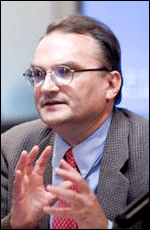Mexico's Midterm Elections and the Future of Democracy
José Antonio Crespo, Professor and Researcher, Centro de Investigación y Docencia Económica (CIDE), Mexico City; Jeffrey Weldon, Professor, Instituto Tecnológico Autónomo de México (ITAM), Mexico City
Overview
In the July 5 midterm elections, Mexico's Institutional Revolutionary Party (PRI) swept elections at all levels of government. The PRI seized five of the six governorships at stake, won important municipal seats, and with a likely alliance in Congress, will hold a majority in the Chamber of Deputies. Panelists attributed the dramatic resurgence of support for the PRI, the party that Mexicans voted out in 2000 after seven decades of near-complete dominance of the political system, to its unified and mobilized campaign which overcame the other major parties' poor strategies and internal ruptures.
The election will impact President Felipe Calderón of the National Action Party (PAN), who must now negotiate his entire reform agenda with the PRI. The negotiations that will take place in the next three years leading up to the presidential elections of 2012 will be crucial tests for all parties involved.
The PRI Machine
 An election with a relatively low turnout, explained José Antonio Crespo, political analyst and professor at the Centro de Investigación y Docencia Económica, favors the party with the best party structure that can get its members to the polls. This election, with 44 percent turnout, revealed that the PRI maintains the strongest national party machinery. The PRI received exactly as many votes as polls indicated (37 percent), whereas support for the other parties amounted to several fewer percentage points than anticipated, especially for the PAN (33 percent anticipated, 28 percent actual).
An election with a relatively low turnout, explained José Antonio Crespo, political analyst and professor at the Centro de Investigación y Docencia Económica, favors the party with the best party structure that can get its members to the polls. This election, with 44 percent turnout, revealed that the PRI maintains the strongest national party machinery. The PRI received exactly as many votes as polls indicated (37 percent), whereas support for the other parties amounted to several fewer percentage points than anticipated, especially for the PAN (33 percent anticipated, 28 percent actual).
Part of the drop for the other parties may also be a high level of voters (6 percent nationally and 11 percent in Mexico City) who annulled their votes to express their frustration with the lack of real debate coming from the political parties. Most analysts believe few of those voters to be PRI supporters, thus the other parties most likely lost voters.
Economic Woes and Violence: Not a Winning Slogan
Polls suggest that Mexicans blame the United States for the economic crisis, whereas the Mexican leadership does not. However, Crespo argued than the state of the economy, estimated to drop 3 to 6 percent this year, undoubtedly drew support away from the ruling PAN. Strategists from the PAN anticipated this and sought to shift the emphasis to the administration's fight against organized crime. While most Mexicans approve of the president (65 percent), Crespo emphasized, it is Calderón's unique determination to go after the cartels. In general, the public disapproves of the associated violence that has claimed over 10,000 lives since 2006. Crespo observed that campaigning on a promise to offer more "sweat, blood, and tears" did not attract and inspire voters.
Nor did the PAN's attempts to remind voters of the 71 years under the PRI; voters also remembered voting for the PAN in 2000 to reshape politics, he noted, and have not seen enough real change.
Divided Left
The internal divisions and perceptions of "radical" politics within the leftist Party of the Democratic Revolution (PRD), also failed to garner much support. The party's presidential candidate in 2006, Andrés Manuel López Obrador, who came within less than a percentage point of winning the presidency, did not campaign for the party in this election. Instead, he supported two smaller parties, the Workers' Party (PT) and Convergencia, which together earned 6 percent of the vote. The PRD earned just 12 percent of the vote.
Business as Usual?
 Pundits wondered if the PRI and its allies' majority bloc in the Chamber of Deputies would derail President Calderón's reform plans, but Jeffrey Weldon, congressional expert and professor at the Instituto Tecnológico Autónomo de México, doubted this will be the case. The PRI and PAN, he noted, voted together 95.5 percent of the time in the past legislative session. The PRI watered down some of the President's reforms in the last session, but the two parties ultimately compromised to pass legislation. Weldon expects a similar pattern in this legislature.
Pundits wondered if the PRI and its allies' majority bloc in the Chamber of Deputies would derail President Calderón's reform plans, but Jeffrey Weldon, congressional expert and professor at the Instituto Tecnológico Autónomo de México, doubted this will be the case. The PRI and PAN, he noted, voted together 95.5 percent of the time in the past legislative session. The PRI watered down some of the President's reforms in the last session, but the two parties ultimately compromised to pass legislation. Weldon expects a similar pattern in this legislature.
However, there are reform packages that may be discouraged or shifted, Weldon explained. The PRI has not prioritized education reform or revamping the tax system, and it may choose to shy away from raising taxes in a recession. Weldon also doubted that the PRI would take up the pressing yet difficult topic of energy reform in this legislature. Thus if the PRI were to win the presidency in 2012, he suggested, it could be willing to take credit for reforming the oil sector.
In addition, the funding of social programs, which the Chamber of Deputies, and thus the PRI, will control, could move in two directions. The PRI has traditionally tried to decentralize more finances to the state governments, many of which they head, which it can then take credit for these programs. Yet if the PRI believes it can retake the presidency in 2012, it will not want to divert federal control over those resources, though it would benefit them in the short run.
The 2012 Presidential Election
Despite a successful election year, panelists cautioned against assuming a PRI candidate will win in 2012. Crespo predicted a three- or four-way race. The PAN, as an incumbent party, can be expected to win at least one-third of votes. The PRI will have had three years to show it can govern at the congressional, state, and local levels, and have a potentially strong candidate waiting in the wings. Nevertheless, while its leaders are unified now, they were divided in the 2006 presidential elections, noted Crespo, which contributed the PRI's disastrous third place finish.
The PT will probably choose López Obrador as their candidate. The PRD, added Weldon, will have to decide between supporting him and running a fourth candidate, which may even further reduce their votes.
By Katie Putnam, Program Assistant, Mexico Institute
Edited By Andrew Selee, Director, Mexico Institute
Documents & Downloads
- Mexico's Midterm Elections and the Future of DemocracyDownload
- Mexico's Midterm Elections and the Future of DemocracyDownload
- Mexico's Midterm Elections and the Future of DemocracyDownload
- Mexico's Midterm Elections and the Future of DemocracyDownload
- Mexico's Midterm Elections and the Future of DemocracyDownload
- Mexico's Midterm Elections and the Future of DemocracyDownload
Hosted By

Mexico Institute
The Mexico Institute seeks to improve understanding, communication, and cooperation between Mexico and the United States by promoting original research, encouraging public discussion, and proposing policy options for enhancing the bilateral relationship. A binational Advisory Board, chaired by Luis Téllez and Earl Anthony Wayne, oversees the work of the Mexico Institute. Read more
Thank you for your interest in this event. Please send any feedback or questions to our Events staff.










